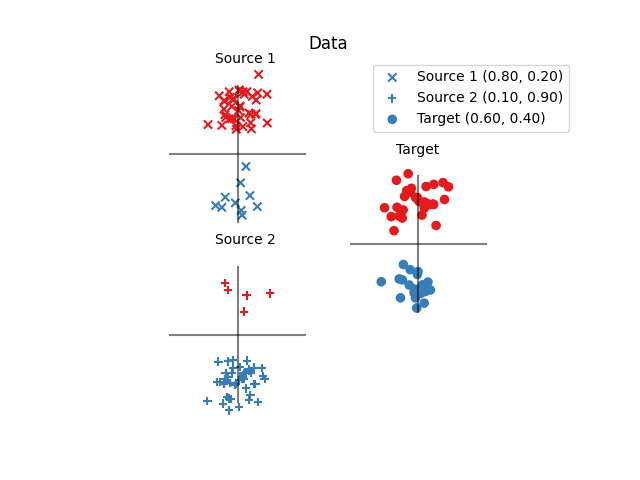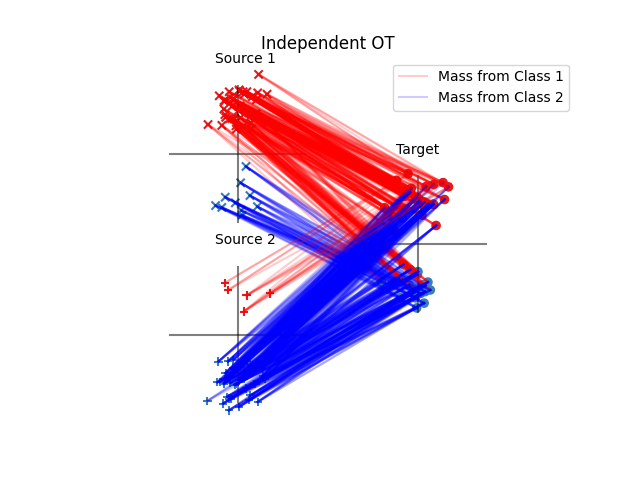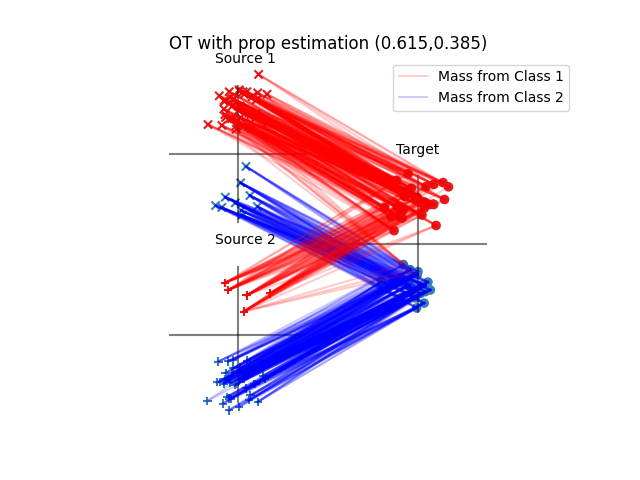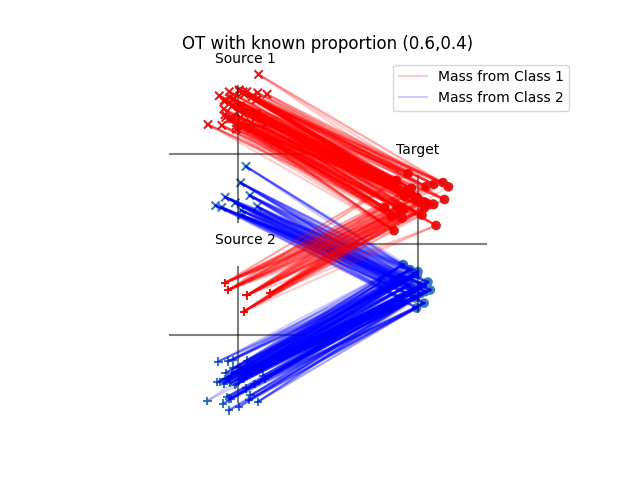Note
Click here to download the full example code
OT for multi-source target shift¶
This example introduces a target shift problem with two 2D source and 1 target domain.
# Authors: Remi Flamary <remi.flamary@unice.fr>
# Ievgen Redko <ievgen.redko@univ-st-etienne.fr>
#
# License: MIT License
import pylab as pl
import numpy as np
import ot
from ot.datasets import make_data_classif
Generate data¶
n = 50
sigma = 0.3
np.random.seed(1985)
p1 = .2
dec1 = [0, 2]
p2 = .9
dec2 = [0, -2]
pt = .4
dect = [4, 0]
xs1, ys1 = make_data_classif('2gauss_prop', n, nz=sigma, p=p1, bias=dec1)
xs2, ys2 = make_data_classif('2gauss_prop', n + 1, nz=sigma, p=p2, bias=dec2)
xt, yt = make_data_classif('2gauss_prop', n, nz=sigma, p=pt, bias=dect)
all_Xr = [xs1, xs2]
all_Yr = [ys1, ys2]
Fig 1 : plots source and target samples¶
pl.figure(1)
pl.clf()
plot_ax(dec1, 'Source 1')
plot_ax(dec2, 'Source 2')
plot_ax(dect, 'Target')
pl.scatter(xs1[:, 0], xs1[:, 1], c=ys1, s=35, marker='x', cmap='Set1', vmax=9,
label='Source 1 ({:1.2f}, {:1.2f})'.format(1 - p1, p1))
pl.scatter(xs2[:, 0], xs2[:, 1], c=ys2, s=35, marker='+', cmap='Set1', vmax=9,
label='Source 2 ({:1.2f}, {:1.2f})'.format(1 - p2, p2))
pl.scatter(xt[:, 0], xt[:, 1], c=yt, s=35, marker='o', cmap='Set1', vmax=9,
label='Target ({:1.2f}, {:1.2f})'.format(1 - pt, pt))
pl.title('Data')
pl.legend()
pl.axis('equal')
pl.axis('off')

Out:
(-1.85, 5.85, -4.046431138906242, 4.129455496299418)
Instantiate Sinkhorn transport algorithm and fit them for all source domains¶
Fig 2 : plot optimal couplings and transported samples¶
pl.figure(2)
pl.clf()
plot_ax(dec1, 'Source 1')
plot_ax(dec2, 'Source 2')
plot_ax(dect, 'Target')
print_G(ot_sinkhorn.fit(Xs=xs1, Xt=xt).coupling_, xs1, ys1, xt)
print_G(ot_sinkhorn.fit(Xs=xs2, Xt=xt).coupling_, xs2, ys2, xt)
pl.scatter(xs1[:, 0], xs1[:, 1], c=ys1, s=35, marker='x', cmap='Set1', vmax=9)
pl.scatter(xs2[:, 0], xs2[:, 1], c=ys2, s=35, marker='+', cmap='Set1', vmax=9)
pl.scatter(xt[:, 0], xt[:, 1], c=yt, s=35, marker='o', cmap='Set1', vmax=9)
pl.plot([], [], 'r', alpha=.2, label='Mass from Class 1')
pl.plot([], [], 'b', alpha=.2, label='Mass from Class 2')
pl.title('Independent OT')
pl.legend()
pl.axis('equal')
pl.axis('off')

Out:
(-1.85, 5.85, -4.046431138906241, 4.129455496299417)
Instantiate JCPOT adaptation algorithm and fit it¶
otda = ot.da.JCPOTTransport(reg_e=1, max_iter=1000, metric='sqeuclidean', tol=1e-9, verbose=True, log=True)
otda.fit(all_Xr, all_Yr, xt)
ws1 = otda.proportions_.dot(otda.log_['D2'][0])
ws2 = otda.proportions_.dot(otda.log_['D2'][1])
pl.figure(3)
pl.clf()
plot_ax(dec1, 'Source 1')
plot_ax(dec2, 'Source 2')
plot_ax(dect, 'Target')
print_G(ot.bregman.sinkhorn(ws1, [], otda.log_['M'][0], reg=1e-1), xs1, ys1, xt)
print_G(ot.bregman.sinkhorn(ws2, [], otda.log_['M'][1], reg=1e-1), xs2, ys2, xt)
pl.scatter(xs1[:, 0], xs1[:, 1], c=ys1, s=35, marker='x', cmap='Set1', vmax=9)
pl.scatter(xs2[:, 0], xs2[:, 1], c=ys2, s=35, marker='+', cmap='Set1', vmax=9)
pl.scatter(xt[:, 0], xt[:, 1], c=yt, s=35, marker='o', cmap='Set1', vmax=9)
pl.plot([], [], 'r', alpha=.2, label='Mass from Class 1')
pl.plot([], [], 'b', alpha=.2, label='Mass from Class 2')
pl.title('OT with prop estimation ({:1.3f},{:1.3f})'.format(otda.proportions_[0], otda.proportions_[1]))
pl.legend()
pl.axis('equal')
pl.axis('off')

Out:
(-1.85, 5.85, -4.046431138906241, 4.129455496299417)
Run oracle transport algorithm with known proportions¶
h_res = np.array([1 - pt, pt])
ws1 = h_res.dot(otda.log_['D2'][0])
ws2 = h_res.dot(otda.log_['D2'][1])
pl.figure(4)
pl.clf()
plot_ax(dec1, 'Source 1')
plot_ax(dec2, 'Source 2')
plot_ax(dect, 'Target')
print_G(ot.bregman.sinkhorn(ws1, [], otda.log_['M'][0], reg=1e-1), xs1, ys1, xt)
print_G(ot.bregman.sinkhorn(ws2, [], otda.log_['M'][1], reg=1e-1), xs2, ys2, xt)
pl.scatter(xs1[:, 0], xs1[:, 1], c=ys1, s=35, marker='x', cmap='Set1', vmax=9)
pl.scatter(xs2[:, 0], xs2[:, 1], c=ys2, s=35, marker='+', cmap='Set1', vmax=9)
pl.scatter(xt[:, 0], xt[:, 1], c=yt, s=35, marker='o', cmap='Set1', vmax=9)
pl.plot([], [], 'r', alpha=.2, label='Mass from Class 1')
pl.plot([], [], 'b', alpha=.2, label='Mass from Class 2')
pl.title('OT with known proportion ({:1.1f},{:1.1f})'.format(h_res[0], h_res[1]))
pl.legend()
pl.axis('equal')
pl.axis('off')
pl.show()

Out:
/home/circleci/project/examples/plot_otda_jcpot.py:171: UserWarning: Matplotlib is currently using agg, which is a non-GUI backend, so cannot show the figure.
pl.show()
Total running time of the script: ( 0 minutes 2.704 seconds)